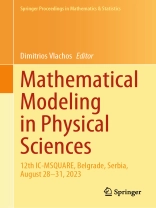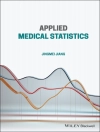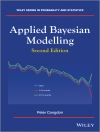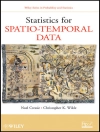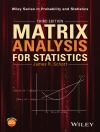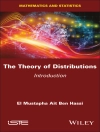This volume gathers selected papers presented at the ICMSQUARE 2023 – 12th International Conference on Mathematical Modeling in Physical Sciences held in Belgrade, Serbia from August 28–31, 2023. This proceedings offers a compilation of cutting-edge research, which aims to advance the knowledge and development of high-quality research in mathematical fields related to physics, chemistry, biology, medicine, economics, environmental sciences, and more. Annually held since 2012, the ICMSQUARE conference serves as a platform for the exchange of ideas and discussions on the latest technological trends in these fields. This book is an invaluable resource for researchers, academicians, and professionals in these areas seeking to stay up-to-date with the latest developments in mathematical modeling.
Spis treści
Part I: Mathematical Methods in Physical and Engineering Applications.- 1.Single and Multi-Material Topology Optimization of Continuum Structures: ABAQUS Plugin( D. Patel, T. Rockenbauer, S. Schlogl, and M. Lang).- 2. Adaptive filtering of distributed data based on modeling the mechanisms of living sensory systems perception(V.E. Antsiperov).- 3. A Method for Fast and Robust Sungular Spectrum Analysis (A. Mavrogianni).- 4. An algorithm for non-negative Leslie matrices (J. Pantaz, J. Rodriguez, and L. Medina).- 5. Statistical approach to the Gompertz growth model and the underlying timescales (A. Samoletov and B. Vasiev).- 6. On 4-dimensional Hom-Lie algebras (M.A. Alvarez and S.V. Vera).- 7. Optimal PD-PD and State Feedback control of underactuated Ball and Beam system with uncertainty and disturbances(Y. Sahu, B. Gupta, M. Wael and R. Shalaby).- 8. Are referees unfair to away teams? Evidence from the Premier League (G. Choi, K. Ahn, H.Jang and D.S. Kim).- 9. The use of twins in isotopic analysis (T. Iavoruk and A. Bazhenov).- 10. Metaheuristic Approaches to tune PID Controller Parameters for Ball on Plate System (M. Ekole, O. Abdalla, I. Shalabi, and R. Shalaby).- 11. Frequency Criterion for the Existence of Sliding Processes in Control Systems with an Arbitrary Variable Structure (V.L. Kodkin and E.A. Kuznetsova).- 12. Least squares for generalized Gauss–Laplace distribution of the error in certain nonlinear regressions with perpendicular offsets (C.E. Stoenoiu and L. J ̈antschi).- 13. On the Influence of Absorption on the Spatial Spectrum of Radio Waves Propagating in the Polar Ionosphere (G. Jandieri, N. Tugushi and I. Mindiashvili).- 14. Computational Bar Size Optimization of Single Layer Dome Structures Considering Axial stress and Shape Disturbance (A. Manguri , N. Saeed , F. Kazemi, N. Asgarkhani, M. Szczepanski and R. Jankowski).- 15. Algorithmic feature selection and dimensionality reduction in signal classification tasks (J. Zavadil, V. Kus and M. Chlada) 16. Two-terminal Reliability of the K4-ladder – Revisited (P. Poulin, S.R. Cowell and V. Beiu).- 17. Comparative Analysis of Authentication Using Formant Features of Vowels and Consonants (Y. Belova).- 18. Hidden and singular attractors in nonlinear systems of differential equations (N. Magnitskii).- Part II: Complex systems and Complex Networks .- 19.Nonlinear Features and Hybrid Optimization Algorithm for Automated Electroencephalogram Signal Analysis(L. Egorova, L. Kazakovtsev and E. Vaitekunene).- 20. Properties of Model Networks Generated by Modified Small-World Scale-Free Fractal Tree Algorithm (N. Ikeda).- 21. Slow-fast dynamical systems with a load variation (E. Savenkova, S. Vakulenko and I. Sudakow).- 22. The problem of premature convergence in engineering optimization problems (K.A. Ponomareva, I.P. Rozhnov and L.A. Kazakovtsev).- 23. Multiple Fuzzy Soft Graphs Based on Maps and Consider their Applications in Decision-Making (S. M. Noori, S. Khalil and A.G. Ahmad).- 24. Assessing the impact of the elimination of intermediary institutions in the system of organizing supply chains and conducting transnational transactions through the blockchain (M.R Safiullin, A.A Dinmukhametova and R.T Burga).- Part III: Sociophysics and Econophysics – Mathematical Models of Human Behaviour and Economics.- 25. Remote Control of Mobile Robotic System Over Web- Based Interface for Supporting People With Physical Disabilities (P. Stoev , D. Chikurtev and R. Ficherov).- 26. Methodology for development of Virtual Reality based resources for education(D. Chikurtev, A. Chikurteva and N. Bogdanova).- 27. Non-Euclidean Geometries and Arts in the beginning of the 20th century: An interdisciplinary Approach for High School students (A. Mavrogianni and G. Kokorelis).- 28. The impact of sanctions pressure on the stability and prospects for the development of the national economy of the Russian Federation(L.A Elshin, M.R Gafarov and A.A Dinmukhametova).- 29. Methodology for assessing the impact of changes in transnational cash flow on GDP growth (on the example of the Russian Federation)(M R Safiullin, A. Dinmukhametova and A.R Sharapov).- 30. The impact of trading environments on commodity futures: Evidence from biofuel feedstocks’ network (M. Jeong , K. Joo , J. Kim , J. Kim , J. Kim and K. Ahn).- Part IV: Finite element and mesh free methods.- 31. Natural convection flow in an inclined wavy porous medium in the presence of an inclined periodic magnetic field(S. Hussain and B.P. Geridonmez).- Part V: Topics in Mathematical Physics.- 32. Pseudogeometric version of the traveling salesman problem, its application in quantum physics models and some heuristic algorithms for its solution (B. Melnikov and D. Chaikovskii).- 33. Solution to infinity problem of scattering matrix using time-evolution operators without needing renormalization(C. Jong).- 34. Nonlinear loading and damping of a single degree of freedom oscillator (O. T. Gudmestad).- 35. Correction for the classical conditions for a collision in three-body system using General Relativity and Machine Learning (H. Salloum, M. Mazzara and M.R. Bahrami).- 36. A novel way of calculating scattering integrals (A.T. Suzuki and T. Suzuki).- 37. Study of Linear Stability for Cylindrically Symmetrical States of Dynamic Equilibrium of Two-component Vlasov-Poisson Plasma (Y.G. Gubarev and J. Luo).- 38. Ranking of Linear Spaces in Generating a Hierarchy between Concepts (Y. Roth).- Part VI: Physical Modeling using Stochastic Differential Equations .- 39. Monte Carlo solution of semi-linear Helmholtz boundary value problem (A. Rasulov and G. Raimova).- 40. Strongly Entangling Neural Network: Quantum-Classical Hybrid Model for Quantum Natural Language Processing (J. I. Diaz-Ortiz, A. Villanueva, and F. Delgado).- Part VII: COVID-19 and Virus Spreading Mathematical Modeling .- 41. Mathematical analysis and optimal strategy for a COVID-19 pandemic model with intervention (P.B. Borah and H.K. Sarmah).- 42. Modeling public fear under the information environment of emergencies as COVID-19 and wars (T. Ohnishi).- 43. Chaotic Model for Development of HIV Virus (M. Qabaja, J. Asad and R/ Wannan).- 44. Stability Analysis of a COVID-19 SEIQR Model with Switching Constant Transmission Rates (T.R.Y. Teng, D.S. Lutero, and M.A.C. Tolentino).- Part VIII: Mathematical Modeling for Sustainable Development .- 45. Modeling Air Pollution Data Using a Generalized Birnbaum-Saunders Distribution with Different Estimation Procedures (B. Saad, F.M.A. Alam, and H. Baaqeel).- 46. Improved Routing for the In-Band Network Telemetry Problem (Thierno Bocar N’Diaye, Marcelo Caggiani Luizelli, Jules Degila, and L.S. Buriol).- 47. House Price prediction using XG-Boost grid search and cross-validaion methods (Z. Tianlei, Y. Yingke, Bao, Shu, and H. Raza).- 48. The Effectiveness of Submerged-Emerged Breakwaters: An Analytical and Numerical Study (I. Magdalena and V. Ferren).- 49. Validation and Numerical Simulation of a Parabolic Trough Solar Collector Plant Using an Implicit Finite- Difference Scheme (R. Rangel, L. Corredor and M. Sanjuan).- 50. Transition to rational models of production and consumption in the framework of the UN Sustainable Development Goals (S. Absalyamova, L. Zulfakarova, G. Shafigullina, R. Sakhapov and M. Makhmutov).- 51. The Chemical Elements with Their Applications in Fuzzy Delta-Algebraic Systems (M. Al-Labad, S. Khalil and A.N. Hassan).
O autorze
Dimitrios S. Vlachos is a Professor at the Department of Economics at the University of Peloponnese, Greece. He was Assistant and Associate Professor in the Department of Informatics and Telecommunications at the same University. He completed his Ph D at the School of Electrical and Computer Engineering of the National Technical University of Athens and followed post-doctoral studies at the Institute of Nuclear Engineering of the 'Demokritos’ Research Center. He also held a research position at the Hellenic Center for Marine Research. His research interests are centered around the discrete variaitonal theory, complex networks, evolutionary algorithms, physical modeling, econophysics and the modern trends in fintech.
